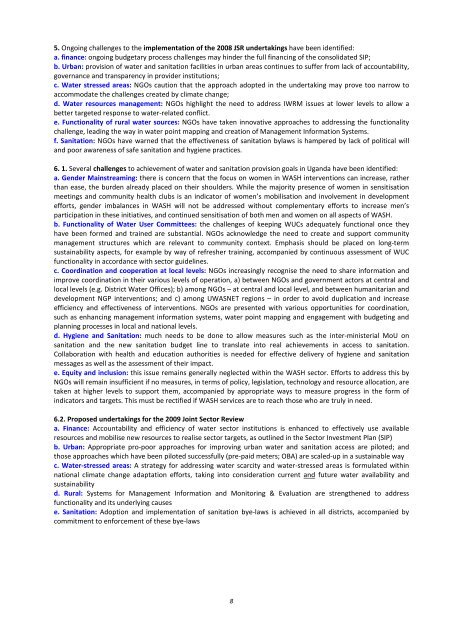Download to Read More - UWASNET
Download to Read More - UWASNET
Download to Read More - UWASNET
You also want an ePaper? Increase the reach of your titles
YUMPU automatically turns print PDFs into web optimized ePapers that Google loves.
5. Ongoing challenges <strong>to</strong> the implementation of the 2008 JSR undertakings have been identified:<br />
a. finance: ongoing budgetary process challenges may hinder the full financing of the consolidated SIP;<br />
b. Urban: provision of water and sanitation facilities in urban areas continues <strong>to</strong> suffer from lack of accountability,<br />
governance and transparency in provider institutions;<br />
c. Water stressed areas: NGOs caution that the approach adopted in the undertaking may prove <strong>to</strong>o narrow <strong>to</strong><br />
accommodate the challenges created by climate change;<br />
d. Water resources management: NGOs highlight the need <strong>to</strong> address IWRM issues at lower levels <strong>to</strong> allow a<br />
better targeted response <strong>to</strong> water-related conflict.<br />
e. Functionality of rural water sources: NGOs have taken innovative approaches <strong>to</strong> addressing the functionality<br />
challenge, leading the way in water point mapping and creation of Management Information Systems.<br />
f. Sanitation: NGOs have warned that the effectiveness of sanitation bylaws is hampered by lack of political will<br />
and poor awareness of safe sanitation and hygiene practices.<br />
6. 1. Several challenges <strong>to</strong> achievement of water and sanitation provision goals in Uganda have been identified:<br />
a. Gender Mainstreaming: there is concern that the focus on women in WASH interventions can increase, rather<br />
than ease, the burden already placed on their shoulders. While the majority presence of women in sensitisation<br />
meetings and community health clubs is an indica<strong>to</strong>r of women’s mobilisation and involvement in development<br />
efforts, gender imbalances in WASH will not be addressed without complementary efforts <strong>to</strong> increase men’s<br />
participation in these initiatives, and continued sensitisation of both men and women on all aspects of WASH.<br />
b. Functionality of Water User Committees: the challenges of keeping WUCs adequately functional once they<br />
have been formed and trained are substantial. NGOs acknowledge the need <strong>to</strong> create and support community<br />
management structures which are relevant <strong>to</strong> community context. Emphasis should be placed on long-term<br />
sustainability aspects, for example by way of refresher training, accompanied by continuous assessment of WUC<br />
functionality in accordance with sec<strong>to</strong>r guidelines.<br />
c. Coordination and cooperation at local levels: NGOs increasingly recognise the need <strong>to</strong> share information and<br />
improve coordination in their various levels of operation, a) between NGOs and government ac<strong>to</strong>rs at central and<br />
local levels (e.g. District Water Offices); b) among NGOs – at central and local level, and between humanitarian and<br />
development NGP interventions; and c) among <strong>UWASNET</strong> regions – in order <strong>to</strong> avoid duplication and increase<br />
efficiency and effectiveness of interventions. NGOs are presented with various opportunities for coordination,<br />
such as enhancing management information systems, water point mapping and engagement with budgeting and<br />
planning processes in local and national levels.<br />
d. Hygiene and Sanitation: much needs <strong>to</strong> be done <strong>to</strong> allow measures such as the inter-ministerial MoU on<br />
sanitation and the new sanitation budget line <strong>to</strong> translate in<strong>to</strong> real achievements in access <strong>to</strong> sanitation.<br />
Collaboration with health and education authorities is needed for effective delivery of hygiene and sanitation<br />
messages as well as the assessment of their impact.<br />
e. Equity and inclusion: this issue remains generally neglected within the WASH sec<strong>to</strong>r. Efforts <strong>to</strong> address this by<br />
NGOs will remain insufficient if no measures, in terms of policy, legislation, technology and resource allocation, are<br />
taken at higher levels <strong>to</strong> support them, accompanied by appropriate ways <strong>to</strong> measure progress in the form of<br />
indica<strong>to</strong>rs and targets. This must be rectified if WASH services are <strong>to</strong> reach those who are truly in need.<br />
6.2. Proposed undertakings for the 2009 Joint Sec<strong>to</strong>r Review<br />
a. Finance: Accountability and efficiency of water sec<strong>to</strong>r institutions is enhanced <strong>to</strong> effectively use available<br />
resources and mobilise new resources <strong>to</strong> realise sec<strong>to</strong>r targets, as outlined in the Sec<strong>to</strong>r Investment Plan (SIP)<br />
b. Urban: Appropriate pro-poor approaches for improving urban water and sanitation access are piloted; and<br />
those approaches which have been piloted successfully (pre-paid meters; OBA) are scaled-up in a sustainable way<br />
c. Water-stressed areas: A strategy for addressing water scarcity and water-stressed areas is formulated within<br />
national climate change adaptation efforts, taking in<strong>to</strong> consideration current and future water availability and<br />
sustainability<br />
d. Rural: Systems for Management Information and Moni<strong>to</strong>ring & Evaluation are strengthened <strong>to</strong> address<br />
functionality and its underlying causes<br />
e. Sanitation: Adoption and implementation of sanitation bye-laws is achieved in all districts, accompanied by<br />
commitment <strong>to</strong> enforcement of these bye-laws<br />
8



